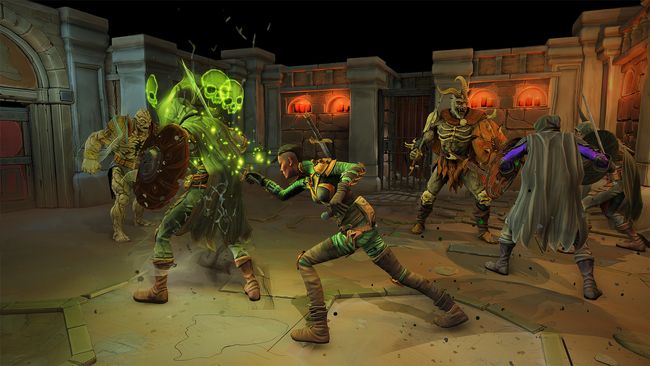Whether you are drawn to Gloomhaven by the call of adventure or by an avid desire for gold glimmering in the dark, your fate will surely be the same. Gloomhaven, the digital adaptation of the acclaimed board game, mixes Tactical-RPG and dungeon-crawling.
Gloomhaven Tips for Beginners
These are just some notes I’ve put together that might be helpful for new player’s who have read/skimmed the rules to help be successful in Gloomhaven.
Tips for Surviving Dungeons
Dungeons are quite tight, you have to get the most out of every single card and action to be regularly successful, that means very few wasted actions or frivolous-burn-card uses.
You should always hold off on resting until you’ve discarded all your cards, even if a discarded card would be perfect for what you need this round, it’s not worth burning a card to get it back. Don’t rest early unless you can do absolutely nothing of value (at least until you get a feel for the game).
It maybe helpful to note that you can always use any card’s top half as regular attack-2, and the bottom half as a move-2; to do this you click the little 2-sword/boot icons in the vertical center of the card on the left or right, click these instead of the big top/bottom half click regions. This might help prevent wasted cards.
Using the default attack/move-2 never causes burn cards to be burned, so if you queue a burn card because you might need it, you can use the default action to save it if you don’t end up needing the big effect.
Each and every card is really more valuable than HP, when you get hit you can sacrifice a card (or 2 discards) to prevent the damage, however this is typically something to be avoided unless necessary (or if you’re running out of healing, and you take a big hit).
How burning cards affects your longevity: If you have a 10-card hand, and never burn or recover a card except to rest, you have total number of rounds of 5+4+4+3+3+2+2+1+1 = 25 rounds. If you burn a single extra card in the first round you have 4+4+3+3+2+2+1+1 = 20 rounds, that’s a huge swing because that card is subtracted from each rest that follows, leaving you with far fewer rounds of play; in round 1 you have to have a HUGE benefit to justify that expense. After your 5th rest however, that cost is substantially reduced 5+4+4+3+3+2+1+1 = 23 rounds. I have no idea how long the average dungeon is, but I want to say it’s in the neighborhood of 12-18 rounds.
It is absolutely ok to use burn cards early, but it does shorten your run substantially, until you get a feel for the game you should lean towards saving them unless you’re sure it’s worth it (for example, burning a big attack to prevent a summoner from summoning another enemy is a great idea, you can queue the card and just use the attack-2 if the summoner dies before it’s needed).
Try to determine when it’s good to move towards the next door, if you have one character who can handle a remaining enemy, don’t move the other character backwards to help, instead have him press on and start the next room.
It’s ok to short rest, but look carefully at the randomly lost card, it is absolutely worth paying a health to save a vital card, however keep in mind you can’t make trade another health for a second redraw, so you could lose a more valuable card by redrawing, typically only 2 or 3 cards in your hand are worth this risk (the health isn’t really a factor typically, it’s more about what other card could be lost).
Do your best to long rest if you have used any reusable items or need health. It’s ok to pop a long rest while actively in combat, but try to do so near the end of a room as combat winds down; you’re going to get 2 more HP than you had (3 more if you consider a redraw on a short rest) so you can take a hit to get your reusable items back in play and to have a choice of what card to discard.
When choosing cards to lose during a long rest, try to balance between saving a fair number of burn cards without leaving yourself short on reusable cards.
Don’t try to get all the loot, especially when you’re struggling, the game is designed to make looting difficult, end your move on a gold stack when it doesn’t interfere, and play loot cards when you’ve got 3+ stacks in range, but otherwise keep your eyes on the goal.
Keep an eye out for the little treasure boxes (usually in the last room), they look like a pine box, and are kinda easy to overlook. Those are worth going out of your way to grab, and you should know whether or not you can spare the actions to do so by that point in the dungeon.
